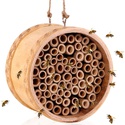Saving bees seem to be all the rage these days. If you thought they were just those scary bugs who fly around your trashcan and sting you from time to time, they actually are more beneficial than we all thought.
Bees are the reason we have fruits and vegetables. Bees are the reason fields stay so green. They are necessary for almost everything in nature staying fertile and lovely. They have also gifted us with honey, essentially making all our lives sweeter. After years of treating them badly, it is time we start to return the favor.
Bee Houses and Bee Baths
Bee houses, or “hotels” as the internet loving calls them, are meant primarily for solitary bees. Think of these guys as the introverts of the bee world; the ones who don’t adhere to the hive mentality. They also tend to be more docile. They are beneficial to the garden, and they need a place to stay. Even calling it a hotel is a misnomer, as the solitary bee typically moves in and will not relocate.
Picking a location for the bee house is imperative to its success. Pick somewhere close to the pollinating plants in the garden, and somewhere close to a fresh water source. Putting it in the shade may attract more wasps than bees, so give it a spot that gets a lot of sun. The key to a successful bee house is to make sure it has a rainproof roof.
Bees need fresh water. They can often collect it from leaves after a rain shower, or in the mornings from dew on plants, but in the drier months, they need our help. In a shallow bowl place some marbles or rocks at the bottom, and then fill it with just enough water that it does not cover the top. Bees can easily drown and when collecting the water, they need a dry place to perch.
Planting pollinators
The first thing to know is that not all flowers attract bees. In fact, there are some plants that repel bees. Bees are very picky when it comes to what they want. If you are one who frequents your local garden nursery, ask the staff which plants would be best for attracting bees. Be specific about which pollinators you want in your garden. Depending on the region you live in, your options will vary. Odds are that each person you ask will have a different answer, which will benefit your garden in the long run. The more, the merrier!
Bees are attracted to bright colors, such as yellow, purple, white, and pink. The brighter, the better. To keep bees coming into your yard all year long, get a variety of plants that will bloom during different seasons.
Herbs can also be a great way to attract bees. Try planting herbs such as lavender and basil in the garden. Mint is another herb that attracts them, but for gardening purposes, you will want to keep it separate.
If you are allergic to pollen, or just have valuable space that you’d rather not waste on flowers, fear not. Bees love flower-bearing fruits and vegetables too! Try planting things like raspberries or blackberries.
If you’ve got the space, bees also love flowering trees. While fruit trees do seem to be the obvious choice here, willows, red maples, and crape myrtles are all attractive to them. This not only gives them a bigger space to forage, but will provide your yard with shade, and possibly an opportunity for that hammock you’ve always wanted!
Making your yard bee friendly
Stay as natural as possible, but if you do need to spray for pests, make sure to use something organic. Have an ant problem? Try beneficial nematodes. Using chemicals in your backyard can drive bees away from the yard. Fertilizers can also contain harmful chemicals, so look for organic or natural ones that will benefit all the critters in your yard.
Here’s a tip that will save you time on the weekends: mow your lawn less. Allow those dandelion weeds to grow. Try as one might to plant all the pollinators, bees still tend to love the weeds the most.
When choosing plants to grow in your garden, make sure the tag says “organic.” This helps to ensure that no harmful fertilizers or insecticides were used in its growth, and that will keep it from being introduced into your space.
Bees in the garden is a good indication that your yard is healthy and thriving! Enjoy the afternoon in the garden making it a more welcoming place for them.


